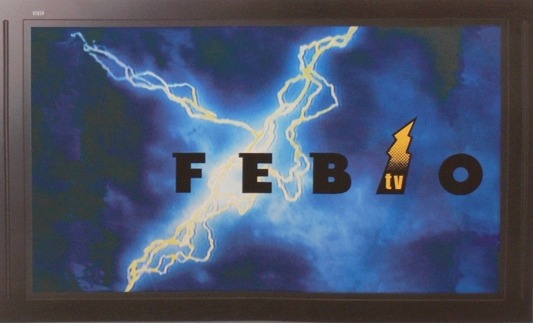
CZECH BUSINESS WEEKLY
Filmfest guru eyes digital TVDigital TV
Filmfest guru eyes digital TV
His Febio company has produced some of the Czech Republic’s longest-running, most influential and popular television documentary series.
He runs Febiofest, the largest film and TV festival in Central Europe, and he is planning to seize the opportunity provided by the introduction of digital television broadcasting to launch his own network, FEBIO TV. Yet, unlike former TV mogul Vladimír Železný, director and producer Fero Fenič keeps a low media profile.
František “Fero” Fenič was born on March 20, 1951, in Nižná Šebastová, a village near Prešov in eastern Slovakia, the youngest of five siblings. He studied journalism for three years in Bratislava and in 1972 moved to Prague to study documentary direction at the Prague film school FAMU, graduating in 1978. It soon became clear, however, that he was not going to see eye to eye with the socialist authorities, who deemed him “politically unreliable.” His first feature film, Džusový román (Juice Novel), which was completed in 1984 at Barrandov Studios, was banned. In 1986 he was accused of “anti-socialist sentiments” and had to abandon his film and television work. He then worked as an independent tour guide for the socialist youth travel office, CKM (Cestovní klub mládeže). Following the heady days of the Velvet Revolution, Fenič began to explore the new possibilities of an emerging, free-media market.
After lecturing at FAMU for a time, he turned producer and set up his own film and television company, FEBIO s.r.o., in December 1991. Almost from the outset, Fenič began developing a long-term relationship with Czech Television. His company went on to produce some of the Czech Republic’s most popular documentary series (GEN, OKO, Jak se žije…, Cestománie) featuring the work of many of the country’s best directors. A skillful communicator, Fenič has maintained a good working relationship with most of them. Open to innovation and willing to take risks, Fenič also provided a platform for the most provocative Czech satirical comedy series, Česká soda. The show was canceled in 1997 and many Czechs still sorely miss it, despite the existence of some of its more vulgar spinoffs, like TV Nova’s Tele Tele.
In 2004, Febio celebrated the completion of its 1,000th TV program. The time had also come for Febio and Czech TV to go their separate ways. Although the split was in the offing for some time, the breakup was less than cordial. Czech TV head Vít Janeček reportedly accused Fenič of moving the popular travel documentary series Cestománie to TV Nova for personal financial gain. Fenič denied the accusation, saying that it was only out of loyalty that he had continued to work with Czech TV for so long. “Reforms or no reforms, [Czech TV] is like the Czech Railways of Czech culture. The thinking of people there is completely isolated from the real world and the market,” he said in a recent interview with Lidové Noviny. Fenič emphasized that only about 20 percent of Czech TV’s estimated annual budget of Kč 4.5 billion (€ 150 million) is allocated to the actual production of TV programs.
Fenič does not hold grudges, however. This week, Czech TV is broadcasting daily updates from the Febiofest film festival, Fenič’s other major hobbyhorse. He set it up in 1993 and, despite recurring financial difficulties, it has grown into the largest festival of film, television and video in Central Europe. With its 538 screenings the Prague program is huge, and to accommodate more visitors the venue has moved to the Village Cinemas multiplex in Smíchov (see related story, page 4). This year it hosts films from a record 65 countries.
During its 12 years, the festival has broken a lot of new ground, mostly thanks to Fenič’s influence. Febiofest has always been multiethnic and multicultural, reflecting not only Fenič’s background but also his beliefs. Despite having lived in the Czech Republic for almost three decades, Fenič admits to speaking a kind of Czecho-Slovak “mumbo-jumbo.” Eastern Slovakia, where he hails from, has always been a cultural and ethnic crossroads, where Slovaks mix with Hungarians, Poles and Ukrainians. Fenič’s great passion is travel and he has often said that he could envisage living abroad, even on another continent.
The festival went progressive in 2002 when it introduced a section featuring gay and lesbian films. Fenič aims to go further. He is working on his own feature film about a teenage boy growing up in the 1950s and 1960s, searching for his identity and coming to terms with his sexual orientation, a theme so far neglected by Czech filmmakers. Fenič is cagey about revealing the details of his personal life, but he says the screenplay reflects “some” of his own experiences.
Fenič is notoriously hardworking. The Czech Who’s Who lists only one item under his hobbies — work. When not in his office or in his sprawling apartment in Old Town, he spends a lot of time in restaurants and cafes. Last year he set up FEBIO TV, which is bidding for a nationwide, full-format license for digital broadcasting. FEBIO TV’s project manager, Petr Sládeček, summed up the company’s ambitious plans at a press conference in December 2004. “We would like to achieve a market share of around 8 to 11 percent within 10 years,” he said.
Fero Fenič
Born: Nižná Šebastová, March 20, 1951
Education: Journalism at Commenius University in Bratislava (incomplete); documentary direction at FAMU (graduated in 1978). Previous employment: Director at Slovenská filmová tvorba in Bratislava-Koliba; first feature film, Džusový román (Juice Novel, 1984), shot at Prague's Barrandov Studios; prevented from working in film until 1989 for being “politically unreliable”; worked as tour guide for CKM; after 1989, lectured at FAMU; in 1991 established the independent film and TV production company FEBIO s.r.o.; in 1993 set up Febiofest, currently the biggest annual international festival of film, TV and video in Central Europe; last year founded FEBIO TV, which is bidding for a full-format digital broadcasting license.
Marek Tomin
